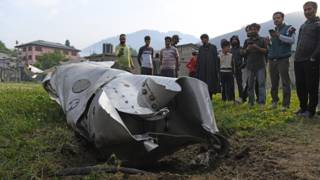
Topics
Guests
- Mosharraf ZaidiIslamabad, Pakistan-based analyst. He writes regular columns for The News of Pakistan and Al-Shorouk of Egypt, which can be found at mosharrafzaidi.com
The US government says the suspect in Saturday’s failed Times Square car bombing has admitted to carrying out the attempted attack. Thirty-year-old Faisal Shahzad was charged Tuesday in a federal court in Manhattan with five counts, including attempting to use a weapon of mass destruction and transporting an explosive device with the intent to kill. [includes rush transcript]
Transcript
AMY GOODMAN: The US government says the suspect in Saturday’s failed Times Square car bombing has admitted to carrying out the attempted attack. Thirty-year-old Faisal Shahzad was charged Tuesday in a federal court in Manhattan with five counts, including attempting to use a weapon of mass destruction and transporting an explosive device with the intent to kill.
Shahzad is a Pakistani-born US citizen and former financial analyst who lived with his wife and two young children in Connecticut. He was arrested Monday night after boarding a plane bound for Dubai. US officials say he’s also admitted to receiving explosives training in Pakistan.
In Washington, Attorney General Eric Holder announced the charges to be brought against Shahzad and described the failed plot as a, quote, “very serious attempt.”
ATTORNEY GENERAL ERIC HOLDER: He has been and continues to be questioned by federal agents. As a result of those communications, Shahzad has provided useful information to authorities. Based on what we know so far, it is clear that this was a terrorist plot aimed at murdering Americans in one of the busiest places in our country.
AMY GOODMAN: Several questions have surrounded Shahzad’s arrest, including how he briefly eluded law enforcement surveillance and how he was eventually tracked down. Law enforcement officials had placed Shahzad under surveillance on Sunday but lost track of him sometime before he made his way to New York’s JFK Airport the next day. He was also allowed to board his flight despite being placed on a no-fly list. A CBS News affiliate reported Tuesday that Shahzad was captured in part because secret US military surveillance planes circling the New York area were able to track his cell phone number.
Meanwhile, federal investigators are focused on the possible involvement of the Pakistani Taliban in the failed bombing. On Sunday, the group released a video message claiming responsibility for the attack, and Shahzad reportedly confessed that he received weapons training in Waziristan, thought to be a stronghold of the Pakistani Taliban. In Pakistan, authorities have rejected claims of the Pakistani Taliban’s involvement and reportedly arrested several people connected to Shahzad, including his father-in-law.
For more on the story now, I’m joined on the line now from Islamabad, Pakistan, by Pakistani analyst and columnist Mosharraf Zaidi.
Welcome to Democracy Now!, Mosharraf. Can you just tell us what is the response in Pakistan and what you know of Shahzad?
MOSHARRAF ZAIDI: Thanks, Amy.
Well, I know about as much as anyone else. Probably there’s many analysts in the US that know more about Shahzad than I do.
And the reaction in Pakistan, of course, is as mixed as the reaction tends to be here. There’s obviously a lot of folks that want this problem to obviously go away, because it affects Pakistan in numerous ways. But this problem, unfortunately — you know, first of all, I mean, I think, obviously, because it’s so fresh and the target is so central, you know, this is a very high-profile thing, but this is really another bump in a long continuum and trajectory of problems that have been developing in a specific part of Pakistan, but that are now being projected onto — really onto Pakistani identity and totality.
So, I mean, the first thing I’d tell you is, you know, the idea that — I’ve just gone through three or four op-eds. Bruce Riedel has written one. Fareed Zakaria has written one. There’s an Indian analyst who just wrote one for the Wall Street Journal yesterday. And all of these op-eds seem to be suggesting that Pakistan is the global epicenter for terrorism. I think things are a little bit more nuanced than that, and I think that the situation deserves that nuance.
AMY GOODMAN: Concern among Pakistanis? I’m looking at Al Jazeera right now about the possibility of the United States bombing Pakistan?
MOSHARRAF ZAIDI: Well, the United States is already bombing Pakistan. The Obama administration has taken its approach to, you know, relations with the Muslim world to totally different levels since it took over. There’s been a huge spike in the number of drone attacks on parts of Pakistan that are known as the Federally Administered Tribal Areas.
AMY GOODMAN: Mosharraf Zaidi, we’re going to have to leave it there. We’ll continue to follow up, of course. I’m Amy Goodman. Thanks so much for joining us.












Media Options